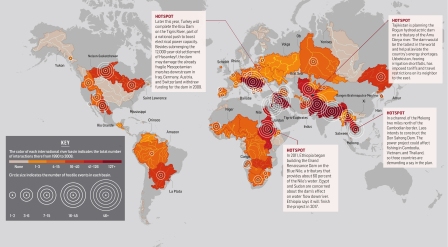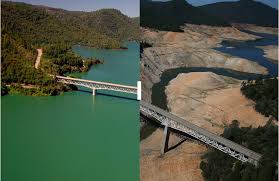 Potential hot spots for water wars - global issues have implications for the US.
Why does political geography scare Americans so much?
The answer is that political geography is a front for economic geography. Thus, economic geography is about the realities of modern economic changes and pressures upon people, commerce, and trade among nation states.
At the same time, in 2014, both geographies are about the end of one era of international order and the emerging birthing process of a new world order.
World orders are funny creatures. Their coming is often well advertised in advance, yet often ignored by the population that will be most impacted.
Wars are the most common fertile grounds for new orders to be born in. Wars provide new energies and new opportunities for outsiders of political and economic powers to challenge those on the onside of the statues quo.
But the most basic fact in scaring Americans with the horrible realities of foreign political geography is that most Americans do not want to be involved in any foreign conflict, no matter how just the fight. Historically, Americans are just fine with hiding behind two oceans.
From the very first days of our history, when President George Washington warned us of foreign entanglements, we, as a nation have been very leery of political geography that seeks to drag us and our military and our wealth and our enormous resources into foreign wars.
Even warned, we have gone to war in far off places almost 400 times in 238
years (see America at War article this edition). We are a nation of dreamers, hard workers, doers, rugged individualism, small towns and big cities where voters decide public issues, not guns or personal threats.
Yet, with all the good and promise of a great America, we are and have always been confronted with the harsh political realities of a world torn into warring tribes and nations.
The world is a dangerous place. At any given moment there are an average of 25 hot spots around the globe that could become full scale wars overnight. People are fighting over (1) access to oil (2) religion (3) forms of government and (4) rights to break away from nations to form new nations.
 In 21st Century, hot spots for future wars will include right to and access to (1) water (2) food and (3) clean air. Global extreme weather and climate change is now number one long term disruptive force facing our military forces. In 21st Century, hot spots for future wars will include right to and access to (1) water (2) food and (3) clean air. Global extreme weather and climate change is now number one long term disruptive force facing our military forces.
Still, we as Americans, we are, at the end of the day, an empire. Vast expenses of the Pacific Ocean and Island nations became American real estate with the bold actions of Theodore Roosevelt. Our interests in the Panama Canal, with a new old built and opening in 2014, plus vast claims to the Atlantic Ocean and Gulf of Mexico keep young our urges to have empire.
Add to this list the possible raw resources of a melting Arctic Circle will demand more attention to our north as major European nations build military, research and supply bases for new oil and rare materials race.
One hundred years ago, the world had 38 nations fighting World War I. One hundred years later, in 2014, almost to the day, there are 45 nations at war fighting terrorism. The war on terrorism masks the give and take of two massive forces at work: (1) globalization and (2) nationalism.
The geography of globalization is about world trade and commerce becoming centralized. The geography of nationalism is about trade, commerce, culture, and technology becoming defused within new boundaries to new centers of power.
Americans are tired of wars and foreign geographies that bleed our domestic resources. However, after almost 14 years of constant foreign wars, Congress is still at a loss on how to work with a President to define a 21st Century foreign policy that works. The geography of war will still frame much of the political debate of the mid term 2014 national elections as well as the 2016 Presidential elections.
Looking at the people, issues, and locations of World War I is eerily very similar to our conflicts in 2014. Throw in the very disruptive impact of extreme weather and climate change to the mix and mankind is at a place never seen before in the modern history of civilization.
Our problem is not to be afraid of geography, but rather can we as nations move fast enough to save the planet and civilization from being destroyed by the miss spent resources to war and not to fixing climate change? |



 In 21st Century, hot spots for future wars will include right to and access to (1) water (2) food and (3) clean air. Global extreme weather and climate change is now number one long term disruptive force facing our military forces.
In 21st Century, hot spots for future wars will include right to and access to (1) water (2) food and (3) clean air. Global extreme weather and climate change is now number one long term disruptive force facing our military forces. 



